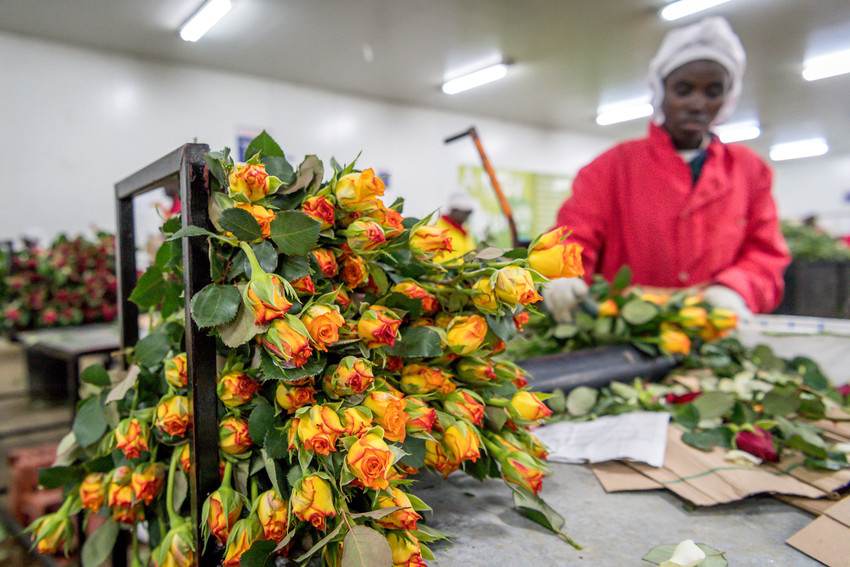There are certain things you would expect to find on a passenger flight: fuel, passengers and certainly a pilot, but you might be surprised to find flowers.
Every year millions of flowers are flown to the United Kingdom, nestled in the cargo of commercial planes. So when several countries imposed flight bans in response to the pandemic last year, flower farmers had a problem.
“We dumped thousands of roses every day,” one Kenyan flower worker told the Fairtrade Foundation.
Flower workers, banana farmers, and cocoa producers alike had to adjust to changing stock demands in 2020, when the effects of COVID-19 saw lockdowns imposed across the globe.
David Taylor, Policy Manager for the Fairtrade Foundation, explained when workers were ordered to stay at home, crops were sometimes left untended, meaning produce was wasted, and even where farmers could continue production, they often saw demand and therefore sales fall.

Credit: Fairtrade Foundation
The pandemic, and the crisis it created for workers already living on the breadline, exemplified the need for fairer trading systems.
Non-profit organisation Fairtrade International, of which the Fairtrade Foundation is the UK affiliate, has been trying to combat injustice in the international trading system for over 25 years.
Fairtrade International ensures producers receive a minimum price, which offers them a safety net if market prices drop, and a premium price, a further sum of money based on how much produce they sell. Committees made up of elected workers can then decide how they want to spend this money in their businesses and communities.
Like most organisations, Fairtrade International had to quickly adapt to changing circumstances last year. Mr Taylor explained: “We had to do a lot of work to try and come through that, both in terms of ensuring that farmers and workers didn’t experience instant poverty from the immediate loss of sales, and then trying to get things back to close to normal as soon as possible.”
“We’re dealing with communities on the brink,” said Mr Taylor.
“They don’t have any savings because their wages aren’t high enough and their living expenses are high.”
The poverty faced by farmers supplying Western markets itself proves that the fair trade movement remains necessary, but the challenges of the last year further highlight why it must continue to be supported. The movement positively aims to improve trading systems over time, but it also provides tangible benefits for those who need it now.
Mr Taylor said Fairtrade has adapted its processes in response to the pandemic, simplifying the system through which premiums can be spent to make the money more readily available and expanding what it could be spent on. Communities used the money for different reasons, including bulk buying food supplies in case of inflation, purchasing PPE and buying bicycles so workers could travel more safely to work.
“I wouldn’t want to claim that Fairtrade has necessarily been perfect, but it’s certainly been our experience that our farmers and workers have been more resilient to this shock than ones not in the Fairtrade scheme, so that’s been a positive,” he added.
Despite the challenges that arose at the start of the pandemic, 2020 saw Fairtrade sales increase by 15%, according to The Ethical Consumer’s Ethical Markets Report.
Whether it’s from having more time to reflect on the ethics of their choices or spending more time in supermarkets because everywhere else is shut, shoppers are increasingly interested in the fair trade movement.
Fairtrade International, whose Fairtrade mark is trusted by 85% of customers, has helped develop its reputation as a leader in the ethical market through the various education schemes it provides.
Not only does the organisation enable groups to sign up to become fair trade schools, universities, workplaces and towns, which they then support as campaigners for fairer trade, it often leads national campaigns. One such event, Fairtrade Fortnight, which runs from February 22 to March 7, will see the organisation host a virtual festival, complete with online workshops, panel discussions, and zoom calls for anyone wanting to find out more about the climate crisis.

Credit: Fairtrade Foundation
The Fairtrade Foundation’s business model has not been without its critics, though.
Research by Dr Carlos Oya, of SOAS University of London, published in 2014, suggested that Fairtrade did not have a positive or negative effect on the wages or working conditions of workers employed by smallholder farmers.
Speaking to Coop News, he explained: “The problem is the assumption that small producer organisations are producers only – so the certification only apples to producers … the people missed out completely are casual and seasonal workers”.
Additionally, producers can’t always sell their produce at the minimum price.

Where Fairtrade does excel is in its attempt to empower all workers. In 2015, Fairtrade revised its standards for hired labour to ensure all workers must be part of the Fairtrade Premium Committee, which decides how to spend the premium from the produce that is sold. Fairtrade producers also hold 50% of the vote at Fairtrade International’s General Assembly.
Dr Mark Dawson, Lecturer in Religion, Philosophy and Ethics at York St John University and Chair of the National Campaigner Committee of the Fairtrade Foundation, wholeheartedly supports Fairtrade, claiming it is one of the certification systems consumers can trust.
Dr Dawson recommends choosing products certified by Fairtrade, or buying from businesses certified by the World Fair Trade Organisation or BAFTS Fair Trade Network UK, because of their rigorous standards.
Speaking of the increase in products being advertised as ‘fair’ or ‘fairly traded’ in recent years, he confirmed: “Lots of people can use that and that in and of itself doesn’t guarantee anything.”
Sustainability expert Dr Smirti Kutaula similarly praised the Fairtrade Foundation’s model for its clear and traceable benefits.
“However, it may not be the solution to all ethical and sustainable issues,” she added.
Consumers might also feel conflicted by environmental concerns raised by fair trade products. Locally sourced flowers would have a lower carbon footprint than flowers imported to the UK, but this choice wouldn’t help marginalised farmers in countries without the social support systems available to farmers here.
The Fairtrade Foundation is hopeful fair trade will be able to reduce its carbon footprint in the future, though Mr Taylor acknowledged everyone involved in the process will need to contribute in order to make changes like introducing electric ships.
For now, customers need to decide what matters to them the most; Dr Dawson advises not giving up simply because a perfect choice can’t be made, since there are still choices to be made that can create real change.




